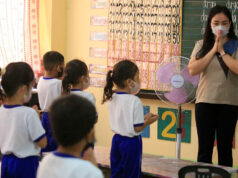
The Department of Education (DepEd) said on Monday that some figures in the 2024 Functional Literacy, Education, and Mass Media Survey (FLEMMS), which showed 18.9 million Filipinos classified as functionally illiterate, have been misinterpreted.
“Recent headlines have inaccurately claimed that 18.9 million high school graduates in
2024 cannot comprehend based on the 2024 Functional Literacy, Education, and Mass Media Survey (FLEMMS),” DepEd Undersecretary Ronald U. Mendoza said in a press release.
According to the department, the data presented in the Senate Hearing by the Philippine Statistics Authority (PSA) on April 30, 2025, indicated that the 18.9 million functionally illiterate Filipinos are not just high school graduates under the DepEd system but also those who can “read, write, and compute, but struggle with comprehension, regardless of their educational attainment.”
“Hamon yan sa educational system, yung pagturo natin ng pagbabasa, pag intindi, yun ay isang [This is a challenge for the educational system, teaching how to read, how to comprehend, that’s a] challenge but not just for the school system but also for all communities,” Education Secretary Juan Edgardo “Sonny” M. Angara told reporters on the sidelines of DepEd and Special Olympics Pilipinas memorandum of understanding (MOU) signing.
“Yung functional literacy minemeasure din diyan yung out-of-school youth eh, so hindi lang yung mga nasa eskwelahan ang sinusukat niya pati yung mga bata na wala sa ekswelahan [Functional literacy also measures out-of-school youth, not just students in schools], Mr. Angara said.
In the 2024 FLEMMS survey, 93.1% of individuals aged 10 to 64 have a strong basic literacy rate, while 70.8% are functionally literate.
The PSA added that on the 2024 functional literacy rate among Filipinos, 53.5% of 10-year-olds are functionally literate, 60.8% of 11-year-olds, 64.7% of 12-year-olds, 68.4% of 13-year-olds, 71.3% of 14-year-olds, 73.7% of 15-year-olds, 75.8% of 16-year-olds, 76.9% of 17-year-olds, and 77.8% of 18-year-olds.
Definitional changes
The definitional changes made by PSA impacted the overall literacy rates, the DepEd said.
“Using the previous definitions, the basic and functional literacy rates would have been 95.1% and 93.1%, respectively,” the department said. “However, under the revised criteria, these figures have dropped to 90.0% and 70.8%, respectively.”
Previously, individuals aged 5 years old and above were classified as ‘basic literate’ if they could read and write. Meanwhile, individuals aged 10 to 64 fall under ‘functionally literate’ if they can read, write, compute, and comprehend, or at least a high school graduate in the old basic education curriculum or a junior high school completer in the K to 12 curriculum.
In the revised criteria for the 2024 survey, basic literates must now be able to read, write with understanding, and compute, while functional literates must be able to read, write, compute, and comprehend.
The PSA noted that by applying the revised definitions in the 2019 functional literacy rates, only 61.7% of Filipinos are functionally literate.
The DepEd aims to boost functional literacy among learners through curriculum reforms, strengthening the Early Language, Literacy, and Numeracy (ELLN) program, enhancing formative assessment practices, institutionalizing Learning Action Cells, and promoting collaborative expertise among educators, and targeted intervention programs, including the ARAL Program, Bawat Bata Makababasa Program, Literacy Remediation Program, Summer Academic Remedial Program, and Learning Camps.
DepEd’s Alternative Learning System (ALS) will also implement the Basic Literacy Program, focusing on developing fundamental skills in reading, writing, and numeracy, along with the Functional Education and Literacy Program (FELP), which emphasizes financial education.
“There are no easy fixes, and we need to continue to raise awareness on the need to dramatically boost investments to move the needle on functional literacy among Filipinos,” Mr. Mendoza said.
“It helps to get our facts straight, so we know we’re on the right path,” he added.



